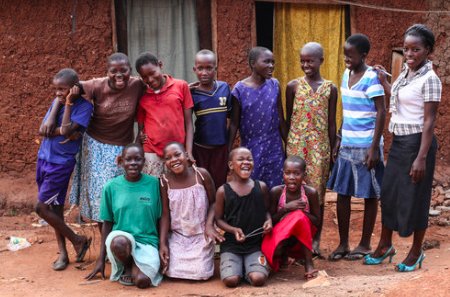Transforming Children’s Lives in Uganda’s Capital
>> Rachel Broadbent (Project Intern)
Kids Club Kampala
Transforming children’s lives in Uganda’s capital – the work of Kids Club Kampala
The UK charity Kids Club Kampala was founded in June 2009 and operates in the slums of Kampala, Uganda. CEO Olivia Barker White explains how the organisation’s objectives are to bring hope and love to vulnerable children and to transform poor communities in the area. Kids Club Kampala aims to overcome the lack of hope and self-esteem of children living in situations of extreme poverty by empowering communities to bring about sustainable change.
Olivia Barker White told us how Kids Club Kampala provides for children’s immediate basic needs whilst working to bring about long-term sustainable changes in their lives, primarily by providing access to education, keeping them safe, and transforming their communities. Over the last 10 years, the organisation has provided 1.5 million hot nutritious meals to hungry children, given over 1,000 children free education, facilitated counselling sessions for over 3,000 vulnerable young people, provided vital training skills to over 700 vulnerable women and reunited almost 100 children back with loving families.
Despite not being a disability or health care focused charity, one of the core values of Kids Club Kampala is inclusivity, and they actively work to include and support the most vulnerable and marginalised groups, including those with disabilities and health conditions, such as people who are HIV positive, have physical disabilities, epilepsy, autism, learning delays and dyslexia. The organisation ensures that the needs of these beneficiaries are met, such as by purchasing their much-needed medicine, paying for check-ups, getting access to necessary equipment, whilst also advocating for their rights within their communities.
Olivia Barker White spoke to us about her encounters with different understandings and explanations for disability. She observes that many believe disability to be the result of a ‘curse’ from a witch doctor, and the person affected is then taken to a witch doctor to have this ‘curse’ removed or to church for a pastor to pray for them to be delivered from the ‘curse’. She highlights that where disabilities are concerned, there are many superstitious beliefs.
Olivia told us the moving story of Simon, who came to the organisation’s Ewafe project home in 2017, which rescues children who have been abandoned and places them into family-based care. He was believed to be around 8 years old and had previously been living in an orphanage nearby that had recently been shut down by the government due to allegations of neglect and abuse. At the time, he couldn’t speak, didn’t make eye contact, didn’t know how to go to the toilet, and wet the bed every night. She explained that Simon has epilepsy, and since this condition is not very well understood in Uganda, it is surrounded by stigma and superstition. Possibly because of this, the orphanage had been keeping him locked in a small room by himself all day every day.
At the Ewafe project home, Simon received care, love, attention, and underwent rehabilitation. As a result, he started to make eye contact, learnt how to use a toilet, and began to communicate. He now loves playing games, especially with cars, and having cuddles with the Ewafe house mother. He has since been assessed by a doctor who prescribed medication to control his epilepsy, meaning he rarely has fits. There are no specialists to diagnose special needs in Uganda, but the organisation suspects he also has autism and ADHD.
Simon stayed at the Ewafe project home for two years and was one of their longest residents. The organisation usually tries to reintegrate children or find foster carers within three months, but his case was complex. Given that he arrived with no paperwork and was unable to communicate, it was nearly impossible to identify him or any relatives. Olivia stresses that just because Simon has additional needs, this doesn’t mean that he doesn’t deserve to live with a loving family. Against all the odds, the amazing social workers managed to find his uncle living not too far away and, after several visits, in March 2019 Simon moved in permanently with him, along with his aunt and cousins. Social workers still check up on him regularly and they are pleased to report that he is doing well and loves playing with his cousins. Kids Club Kampala are supporting the medical costs for his epilepsy treatment. Now, Simon has a loving family, a permanent home, and a bright future.

